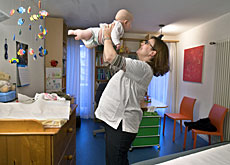Mental health on the mend, but more seek help

The feeling of mental well-being has been improving among the Swiss, according to a study, yet the number seeking psychological help has gone up slightly.
And specialists warn that too many people are still suffering from mental problems – a situation that could get worse if the economy takes a downturn.
The Swiss Health Observatory reported on Thursday that 55 per cent of the population said they felt emotionally stable, up ten per cent on 1992. The number of people suffering from minor troubles like disturbed sleep patterns or nervous tension, as well as those with severe chronic problems dropped at the same time.
However, more people have been consulting mental health professionals. Men are also more likely to see a specialist than women.
The report says it is unclear why more people are seeking treatment, but suggests three possible factors.
In the first place, doctors now pay more attention to mental illness; secondly, there is a greater range of treatment available, and finally, less stigma is attached to mental problems.
The trend to seek help has had an impact on the social security system.
The number of people drawing disability benefits as a result of mental health problems has risen sharply over the past decade, adding to the strain on the benefit system. They accounted for more than one third of claimants in 2005.
The observatory’s report highlights that mental health problems also have a direct impact on productivity. It estimates that in 2005 the overall cost to the economy was SFr18 billion ($15 billion) due to decreased productivity and prolonged absenteeism.
Economy a factor
The Swiss economy is healthier now than it was two or three years ago, and a feeling of economic well-being has an important impact, according to specialists.
“When the economy is going badly you have more unemployment, more family problems. If you have no work for two years you become depressed. You can end up with a psychiatric illness,” said Hans Kurt, president of the Swiss Society for Psychiatry and Psychotherapy.
“This study is very helpful as an indication,” he told swissinfo. “However, the situation is more complex than it shows.”
“And the figures are only optimistic if you compare it with the previous study. We still have 45 per cent [who feel they have some kind of mental problem] and that is a lot.”
He warned against seeing the results as evidence of a continuing trend.
“If the economy worsens, or we have more problems with the environment or political problems, it could change again,” he said. “It depends very much on people’s living conditions.”
swissinfo with agencies
The Swiss Health Observatory monitors health and the health-care system in Switzerland on behalf of the central government and the cantons.
A unit of the Federal Statistics Office in Neuchâtel, it specialises in health in old age, psychological health and health-care systems.
An EU study published in 2005 found that about 27 per cent of adults in the EU aged between 18 and 65 had suffered from at least one mental disorder in the preceding 12 months.
The study indicated that all mental disorders led to a considerable number of working days lost.
It also found that only about one quarter of those affected consulted professional health care services.
Most at risk were adolescents and older people.

In compliance with the JTI standards
More: SWI swissinfo.ch certified by the Journalism Trust Initiative











You can find an overview of ongoing debates with our journalists here . Please join us!
If you want to start a conversation about a topic raised in this article or want to report factual errors, email us at english@swissinfo.ch.